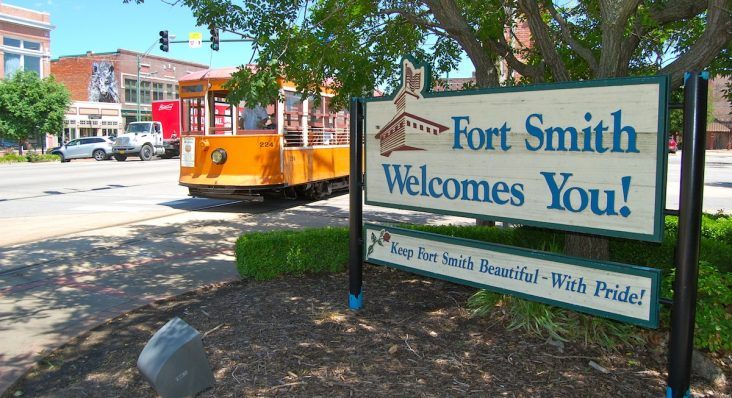CBID approves 8 mil assessment, will work to gain property owner approval
by April 20, 2021 3:37 pm 1,014 views

Fort Smith Central Business Improvement District commissioners voted Tuesday (April 20) to set a cap of 10 mils on a possible property assessment in the CBID – primarily in downtown Fort Smith – and to cap any property owner at a maximum $10,000 on assessment.
There are about four properties in the assessment area that cap will affect, Deputy City Administrator Jeff Dingman said. The caps were the final decisions needed to complete a draft of a petition to the Fort Smith Board of Directors to levy a supplemental annual assessment on property in the CBID for operation, maintenance and repair and replacement of improvements within the CBID.
The assessment, if approved, will not be able to be levied in 2021. The earliest the CBID could receive funds would be in 2022.
The CBID approved a resolution in November that could lead to a 6 mil assessment on property in the district that could fund a “Safety and Security” program for the downtown district. At Tuesday’s meeting, commissioners voted to make the initial assessment 8 mil instead of 6 mil in order to reach the $300,000 they hoped to collect annually. Commissioners have stated they will decide each year what the coming year’s assessment will be if the assessment passes.
According to state law, there are two types of assessments that can be levied against real property inside a city’s improvement district – a project/improvement-specific assessment, levied to fund a “specific ‘plan of improvement,’” or a supplemental annual assessment to be used for ongoing operations or maintenance activities, Dingman noted in August 2019, when the board voted to pursue an assessment on downtown business. At the time CBID Chair Bill Hanna said the CBID is one of the few in the state not funded by an assessment.
The CBID commission plans to use assessment funds to support an ambassador program that would hire off-duty police officers as part of a Safety and Security program for downtown. That program would cost about $136,000 annually, according to a proposed operating budget.
The assessment would also fund a Green and Clean project that would include streetscape maintenance and landscaping, which could incorporate care of flowerbeds as well as pruning and possible replacement of trees, cleaning and repairs to benches, lighting and trash receptacles, litter control, conversion of lights along Garrison Avenue to LED and more. The CBID would need about $300,000 to fund both programs, Dingman said.
Based on property values in 2019, each 1-mil assessment on properties within the CBID would amount to $38,834.47 in annual operating revenue. However, that estimate did not take into account any property owned by not for profit agencies or local, state or federal government. There are 470 individual parcels in the CBID. Of those, 115 are tax-exempt and have no value assigned to them. These include properties owned by governments, non-profits, churches, etc., according to information provided by the CBID.
In 2019, the CBID hired Total Assessment Solutions (TAS), Sebastian County’s contracted third-party appraisal partner, to assess those properties. Looking at the total appraised property, each 1-mil assessment on all properties within the CBID would amount to approximately $61,000. However, some of those properties would be exempt from the assessment. While some government properties would continue to be exempt from the assessment, not for profit entities would not be, said Michelle Allgood, the attorney working with the CBID on the assessment question.
Hanna said the commissioners had agreed that city properties would not be assessed, but county and state properties would be.
Before an assessment can be levied, property owners who own more than 50% of the property value in the district must sign a petition agreeing to an assessment. There are 479 individual properties in the district, some of which are owned by the same entity. Commissioner Phil White suggested each of the eight commissioners pick 10 property owners and go talk to them about the assessment.
Dingman suggested the CBID host a public forum to explain the assessment and how the funds would be used. Commissioners hosted a public forum in February 2019 seeking input on what needed to be done in downtown Fort Smith. They hoped to get 100 people to attend that meeting. Well over that number attended, Hanna said. Commissioners agreed that a public forum regarding the assessment would be even more highly attended.
Talicia Richardson, 64.6 Downtown executive director, said many downtown property owners she has talked with have indicated they are for the assessment, but want details on programs the assessment will fund.
“I think a public forum would be an excellent idea. It would allow for an open dialogue, and that is what is so important,” Richardson said.
Once the signatures are gathered, the CBID board of directors will present that petition and the plan to the Fort Smith City Board of Directors. Dingman said under the state law if the CBID has the required signatures on the petition, the city’s BOD would be compelled to approve the assessment as an ordinance.
